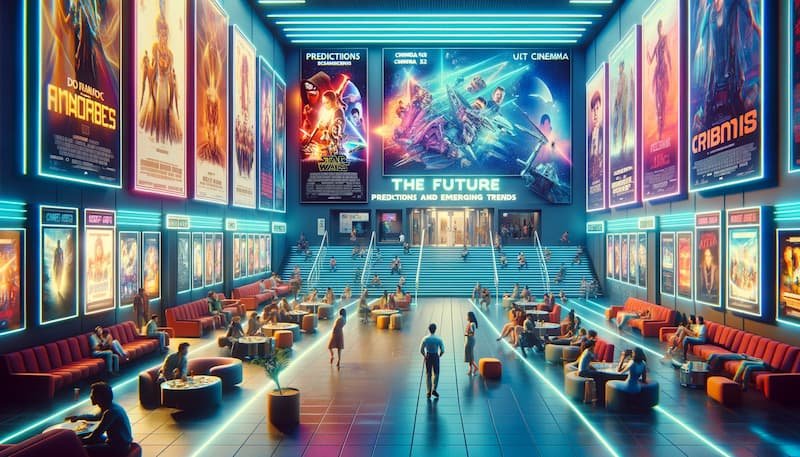Predictions for the Future of the Film Industry
- By -Lepage Kathy
- Posted on
- Posted in Film

Technological Advancements Shaping Filmmaking
Virtual Production and AI Integration:
- Enhanced Visual Realism: Virtual production technologies, coupled with artificial intelligence (AI) advancements, will enable filmmakers to create hyper-realistic environments and characters with unprecedented detail and interactive capabilities.
- Efficiency and Cost-effectiveness: AI-driven analytics and production tools will streamline filmmaking processes, reducing costs and time while enhancing creative possibilities and production quality.
Augmented Reality (AR) and Virtual Reality (VR) Experiences:
- Immersive Storytelling: AR and VR will evolve to offer more immersive storytelling experiences, allowing audiences to participate in narratives, explore virtual worlds, and engage interactively with characters and environments.
- Expanded Audience Engagement: VR cinemas and AR-enhanced screenings will transform the audience experience, blending digital and physical spaces to enhance viewer immersion and emotional engagement.
Evolution of Audience Trends and Consumption Habits
Streaming Dominance and Hybrid Releases:
- Digital-first Strategies: Streaming platforms will continue to dominate distribution, prompting studios to adopt hybrid release models that combine theatrical releases with simultaneous digital premieres to maximize audience reach and revenue streams.
- Personalized Content: AI-driven algorithms will personalize content recommendations based on viewer preferences, behavior analytics, and demographic data, catering to diverse audience tastes and enhancing viewer satisfaction.
Globalization and Diverse Representation:
- Cultural Diversity: Global audiences will demand diverse representation and authentic storytelling that reflects their cultural identities and experiences, driving filmmakers to explore and celebrate diverse narratives from around the world.
- Inclusive Filmmaking: Initiatives for inclusive casting, storytelling, and behind-the-scenes diversity will reshape industry norms, fostering equity, representation, and empowerment across all facets of filmmaking.
Cultural and Industry Shifts
Impact of Social Media and Influencer Marketing:
- Audience Engagement: Social media platforms will amplify film marketing, audience interaction, and viral content dissemination, influencing box office success and audience perception before and after release.
- Digital Storytelling: Short-form content and digital platforms will nurture emerging filmmakers, allowing for experimental storytelling, niche audiences, and grassroots movements that challenge traditional studio models.
Environmental Sustainability and Production Practices:
- Green Filmmaking Initiatives: Industry-wide efforts will prioritize eco-friendly production practices, renewable energy use, and carbon footprint reduction to mitigate environmental impact and promote sustainable filmmaking practices.
- Industry Responsibility: Filmmakers and studios will advocate for social causes, sustainability, and ethical practices, aligning film narratives with global movements for social justice, climate action, and humanitarian advocacy.
Conclusion
The future of the film industry promises a dynamic landscape of technological innovation, audience engagement, and cultural evolution that reshapes cinematic storytelling and industry practices. As filmmakers embrace virtual production, AI integration, and immersive experiences, they will pioneer new storytelling frontiers that blur the lines between fiction and reality, while audience trends favor streaming convenience, personalized content, and global diversity in cinematic narratives. With a focus on sustainability, inclusivity, and digital connectivity, the film industry stands poised to inspire, entertain, and provoke societal dialogue through transformative narratives that resonate across borders and cultures in the evolving digital era of cinema.



